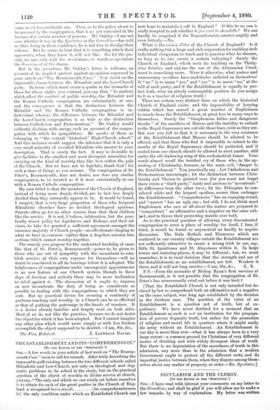THE ESTABLISHMENT AND ITS " COMPREHENSION. ' •
[To THE EDITOR OF THE " SPECTATOR."
bR,—A few words in your article of last week on "The Bourne- mouth Case " seem to call for remark. After truly describing the impassable gulf existing between the two different schools called Ritualistic and Low-Church, not only on theological and dog- matic problems to be solved in the study, but on the practical question of the object of worship in divine service at church, you say," The only end which we can wisely set before ourselves is to obtain for each of the great parties in the Church of Eng-
land a recognised locus standi [its comprehensiveness is] the only condition under which an Established Church can
now hope to maintain itself in England." If this be so, one is really tempted to ask whether le jen raid la chandelle ? We can hardly be surprised if the Nonconformists answer angrily and even bitterly,—No.
What is the raison d'être of the Church of England ? Is it really nothing but a large and rich corporation for enabling each individual clergyman to teach and to practise what he chooses, so long as he can secure a certain following ? Surely the Church of England, which rests its teaching on the Thirty- nine Articles, and enjoins the use of the Athanasian Creed, must be something more. Were it otherwise, what useless and unnecessary E a cri fices have multitudes inflicted on themselves! If " no " is to mean " yes," and " yes " is to mean "no," at the will of each party, and if the Establishment is equally to pro- tect both, what an utterly contemptible position do you assign to it as a teacher of religious truth
There are certain very distinct lines on which the historical Church of England exists, and the impossibility of keeping within which has caused a great number of Englishmen to secede from the Establishment, at great loss in many ways to themselves. Surely the "blasphemous fables and dangerous deceits " of the sacrifices of Masses and the inability to submit to the Royal Supremacy are outside those lines, wide as they are. But now you tell us that it is necessary to the very existence of the Establishment that Masses should be allowed to be offered, and that those who find it impossible to submit to the results of the Royal Supremacy should be protected, and if ousted from one church should be allowed to erect another, still under the all-shadowing wing of this ecclesiastical Janus. Your words almost recall the terrified cry of those who, in the up- rooting of Christianity, foresaw, as the main evil, "danger to the Establishment." Yon practically say : Let Catholicism and Protestantism intermingle ; let the distinction between Chris- tianity and Theism be painted over (for you must not forget there exists a " third party," ready and anxious to "accentuate" its differences from the other two); let the Ethiopian be con- sidered white and the leopard spotless, sooner than endanger the Establishment. " Comprehensive " has an engaging sound, and " narrow " has an ugly one ; but still, I do not think most Englishmen who care at all about the matter are prepared to " comprehend " an affirmative and a negative on the same sub- ject, and to throw their protecting mantle over both.
As to the practical question of allowing every discontented congregation to erect a place of worship for itself, I fear, if tried, it would be found so unpractical as hardly to require discussion. The little Bethels and Ebenezers which are scattered in our country villages outside the Establishment are not sufficiently attractive to create a strong wish to see, say, little St. Ignatiuses and St. Aloysiuses within it. In large towns and watering-places, it may be different ; but, we must remember, it is in rural districts that the strength and use of the Establishment, as an establishment, are felt. Weaken it there, and it will not long survive.—I am, Sir, &c., Z . S.
P.S.—From the accounts of Bishop Ryan's first services at Bournemouth, is it not possible that the congregation of St. Peter's has unnecessarily cried out before it was hurt ?
[That the Established Church is not only intended but de- clared by law to comprehend both an affirmative and a negative on the same subject, was long ago established by the decision in the Gorham case. The question of the value of an Establishment is a question not of truth, but of ex- pediency. We have never doubted for a moment that an Establishment as such is not an institution for the propaga- tion of precise dogmatic truth, but rather for the promotion of religious and moral life in quarters where it might easily die away without an Establishment. An Establishment in our day is more than ever—what it has always been to a very large extent—a common ground for Christians of very different modes of thinking and with widely divergent ideas of truth But there is no depreciation of the sacredness of truth in this admission, any more than in the admission that a modern Government ought to protect all the different sects, and do impartial justice between them, when they dispute among them- selves about any matter of property or order.—En. Spectator.)


































 Previous page
Previous page